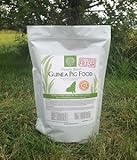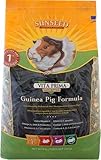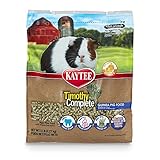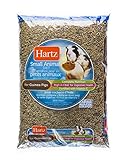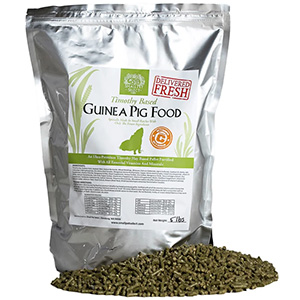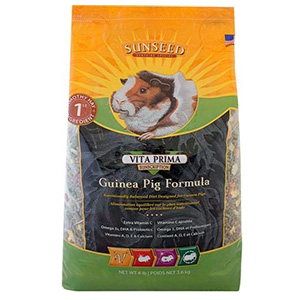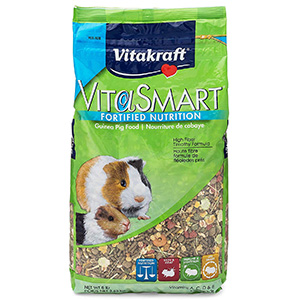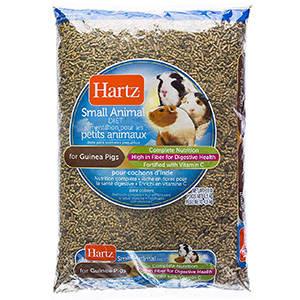- in Guinea Pigs by pets
Guinea Pig Pellet Recommendations

Finding the right food for your guinea pig very important. According to PetMD guinea pigs are unable to manufacture vitamin C naturally, making them susceptible to scurvy if their diet does not provide the appropriate nutrients. Your guinea pig must want to eat the food, and it must be nutritious to keep her healthy.
To help you find the best food for your piggy that is both nutritious and delicious, my guinea pig Nutmeg and I set out on a Amazon prime taste testing adventure of 5 popular brands of pellets. Here are our results:
Top 5: Guinea Pig Pellets Review
Small Pet Select is a small family owned company that originated in Washington State. The family that owns the company owns small animals and understands that they can be persnickety eaters if food is not fresh, which formed their small batch, farm to bowl philosophy.
If you have experienced a scary recall from a large pet food manufacturer, you will appreciate their small batch business model.
I personally love supporting small businesses, so their business model was a plus for me. The care that goes into the manufacturing also gave me confidence to purchase this product. Nutmeg absolutely loves this food.
Pros
Cons
Sun Seed Guinea Pig Food is made in America and formulated to include the fiber and extra vitamin C that piggies need.
Overall, customers and their guinea pigs have nothing but good things to say about this product. The only bad reviews mention high price and that a few guinea pigs refuse to eat the food.
I love that this food is made in America. Nutmeg absolutely loved this food, but she did pick out the "fun" pieces similarly to how a child would eat the marshmallows out of cereal.
Pros
Cons
Vitakraft Guinea Pig Food was formulated with the health of guinea pigs in mind. Packed with essential nutrients, this product contains a mixture of pellets, hay, dried vegetables, and other colored pellet like items.
While guinea pigs rave about the mixture, pet parents should look out for selective eating to ensure that the necessary nutrients are provided in other ways if their guinea pig will selectively eat this food.
Nutmeg ate this food, but she was not wildly excited about it.
Pros
Cons
Kaytee Guinea Pig Food is a simple pellet food designed by animal nutrition experts; it provides exactly the nutrition your guinea pig needs. This company has over 150 years of experience, giving pet parents peace of mind that they are purchasing tried and true guinea pig food.
I love Kaytee as a brand; I have only had good experiences with their products. Nutmeg eagerly ate these pellets.
Pros
Cons
Hartz designed the recipe of their guinea pig food based upon the taste preferences of guinea pigs, and with the goals of maximizing consumption of healthy nutrients and minimizing wasted food.
Nutmeg eagerly ate these pellets because she loves alfalfa hay, but I did notice she gained some weight while she was eating it.
Pros
Cons
Buying Guide
To help you become the best nutritionist for your guinea pig, I have compiled some advice with the help of Nutmeg to guide you in your purchase of pellets.
What Foods Do Guinea Pigs Like Best?
Guinea pigs love fresh Timothy hay, fresh water, and fresh pellet foods. Alfalfa hay may be fed as an occasional treat, and commercial guinea pig treats should be fed in moderation.
Piggies need fresh vegetables and fruits in their diet too. This is an excellent way to improve your diet, as you may eat many of the same vegetables and fruits as your piggy does, such as:
See this chart recommended by Metropolitan Guinea Pig Rescue for a list of how often what types of fruits and vegetables may be fed to guinea pigs.
When offering fresh fruit and vegetables, be sure to remove any uneaten pieces 2 hours after serving; do not make a compost pile of food in their cage.
What Kind Of Pellets Do Guinea Pigs Eat?
According to Metropolitan Guinea Pig Rescue, piggies under 6 months of age, or who are pregnant or nursing, should be fed pellets made with alfalfa, because alfalfa pellets are full of the extra calcium and calories that they need. Piggies over 6 months of age should be fed a Timothy hay based pellet diet. If your guinea pig does not need the extra calcium, calcium stones may form, which are painful and require surgical removal.
Are Pellets Necessary For Guinea Pigs?
Yes, pellets are necessary for guinea pigs. They are the foundation of a healthy diet. The ASPCA recommends that piggies be fed plain pellets that do not include any additional additives like seeds, corn, dried fruits, nuts, or colored pieces to prevent selective eating.
Is Hay Necessary For Guinea Pigs?
Yes, guinea pigs require hay to aid their digestion and to help with their oral health. According to Metropolitan Guinea Pig Rescue, piggies should be offered grass hay, Timothy hay, orchard hay, or bluegrass hay.
Small Pet Select also sells hay. One of the owners, Billy, noticed that his guinea pig, Lizzie, much preferred fresh hay. He began purchasing fresh hay for her from local farms, and shortly thereafter, he began to take steps to open the Small Pet Select company. Small Pet Select takes steps to ensure that the hay is delivered to your door for your guinea pigs to enjoy in the most fresh condition that it can be in. The company packages hay in cardboard rather than plastic bags, as this practice allows the hay to breathe better and remain as fresh as possible.
Is Hay Necessary For Guinea Pigs?
The Importance Of Vitamin C:
Guinea pigs solely rely on their diet to obtain vitamin c, making it your responsibility to ensure they receive enough of this nutrient. Vitamin c may be obtained through their pellets, and by eating vegetables and fruits. Nutmeg enjoys getting her vitamin c by eating Oxbow Vitamin C Biscuits.
Metropolitan Guinea Pig Rescue does not recommend putting liquid vitamin c drops in your guinea pig's water or food, because it tastes bitter and may discourage eating and drinking.
Guinea Pig Treats:
Commercial guinea pig treats like yogurt drops or honey seed sticks should be fed in moderation. Fruits like strawberries, apples, and watermelon may be considered treats if you wish, as they should be fed in moderation anyway.
Using Food For Enrichment Activities:
To enrich your guinea pig's daily life, you could hide snacks in food puzzle toys or make a forage bag or tube.
To make a forage bag, use a paper lunch bag or paper shopping bag with no colored print or dye on it. Stuff it with food and hay so that your guinea pig has to work and think to get her snacks. Nutmeg loves this and often shreds the bag, making extra bedding for herself.
You could also stuff some snacks into a toilet paper or paper towel tube, then fold in the ends so that your guinea pig has to pull and chew apart the tube to get to her snacks. Nutmeg enjoys this activity with carrot sticks and apple slices.
Here are food puzzle toys that you could add on to your guinea pig's pellet order: Winnie's Honey Treat Pot and the Niteangel Treat Ball.
Lastly, I often prepare a snack for myself, then pick up Nutmeg and wrap her in a fleece blanket, so I can cuddle her while I share my snack with her for a bonding experience.
What Foods Should Guinea Pigs Avoid?
Guinea pigs should not eat human foods like chocolate, cereal, cookies, crackers, pasta, etc.
The ASPCA Poison Control website has a more indepth list of foods that animals cannot eat for your reference.
Top Pick
Based upon Nutmeg's preferences and my research of the food's nutrition and quality, the winner of the top 5 guinea pig pellets is: Small Pet Select Guinea Pig Food Pellets. The company's dedication to freshness and quality was evident.
Final Verdict
Based upon the research Nutmeg and I conducted, Small Pet Select Guinea Pig Food Pellets was our top pick. There are many varieties of guinea pig pellets available for purchase. If you are unsure which product would be best for your guinea pig, consult with an exotic veterinarian.
